Challenges in Bangladesh-US relations

On March 26, 2023, US President Joe Biden greeted Prime Minister Sheikh Hasina on the occasion of Bangladesh's Independence Day. Biden also reminded Hasina to hold free and fair elections in December 2023. "As Bangladesh approaches its next election, I am reminded of the deep value both of our nations' people place on democracy, equality, respect for human rights, and free and fair elections," he said.
The United States has placed a strong emphasis on human rights and democracy in its foreign relations. The promotion of these values has been a key part of US foreign policy, and has been pursued through a variety of means, including diplomatic efforts, economic incentives and sanctions, and military intervention in some cases – even though its relations with some authoritarian states put question marks on its declared policy of upholding democracy and human rights. The US under the Biden Presidency has also been focusing on these two values to deal with Bangladesh, which was partially absent during the Trump administration.
Since 2014, Bangladesh has been grappling with the challenges of upholding democratic values and human rights, which have been exacerbated in recent times. The two most recent elections, which were held under the Awami League government in 2014 and 2018, were heavily criticised by the international community, with widespread human rights violations occurring during this period. The regime has employed various means to suppress dissent, including the Digital Security Act (DSA).
The United States and Bangladesh have had diplomatic relations since 1972. The US has become one of Bangladesh's largest trading partners, with over $8 billion in bilateral trade in 2021, and has provided development assistance in areas such as education, health, and economic growth. The US and Bangladesh also work together to combat terrorism and promote regional stability through joint military exercises and training for Bangladesh's security forces.
The US-Bangladesh relationship has had some tensions due to human rights concerns. The US has criticised Bangladesh's government for cracking down on political opposition, and limiting freedom of speech and assembly. The US has imposed sanctions on the Rapid Action Battalion (Rab) for violating human rights. The US human rights reports of 2021 and 2022 have highlighted issues of enforced disappearances, extrajudicial killings, political marginalisation, and election rigging. As a result, Bangladesh was not invited to the Biden Democracy Summit, signalling a shift in US policy towards Bangladesh.
US' push for democracy and human rights has definitely angered the Bangladesh government. Its bottled rage has bubbled up in various ways. Prime Minister Sheikh Hasina considers US sanctions on Russia as a form of human rights violations. "I don't really know what rationale there is for making people suffer like this. In a way, this is another violation of human rights. Depriving people of what they are owed… I hope the US sees the necessity of stepping aside from that decision [of putting Russia under sanctions]. We hope they prefer to punish a single country instead of the people of the world and see that everyone wants it withdrawn." Recently, Hasina commented in the parliament that, "It (US) has the power to topple the government in any country and particularly the Muslim countries."
Liberation War Affairs Minister AKM Mozammel Haque blamed the US for not recognising the genocide against Bangladesh in 1971. He said that the United States has recognised the genocide of the Rohingya in Myanmar. But it did not recognise the genocide that took place in Bangladesh, because it had direct involvement in it. At that time, the governments of the US and UK were not in favour of our Liberation War. But the people of those countries and the world were on our side.
That said, Bangladesh's apathy towards the US is quite clear. Meanwhile, China and Russia have extended their hands with "baskets of money", while Bangladesh is facing serious economic crises. Geopolitical interests for both US and China-Russia are well noted in the Indo-Pacific region.
The US invited Bangladesh to join the Quad in October 2020, citing the country as a key partner in the Indo-Pacific region, and later invited it to the US-led IPS (Indo-Pacific Strategy). China responded by warning that Bangladesh's relations with China would be harmed if it joined the Quad, while also offering Bangladesh the chance to join its Global Development Initiative and Global Security Initiative. The US and Russia have also engaged in a war of words over Bangladesh, with the Russian Foreign Ministry accusing the US ambassador in Dhaka of trying to influence the domestic process of the country, and the Russian Embassy in Dhaka criticising countries with "hegemonic ambitions" that interfere in the internal affairs of others under the pretext of protecting democratic values.
The ongoing Ukraine-Russia conflict has resulted in a surge of high-level visits from China and the United States to Bangladesh, highlighting Bangladesh's growing importance in the Indo-Pacific region. This geopolitical reality is crucial for Bangladesh's future trajectory. For the first time, Bangladesh has articulated its distinct objectives in the Indo-Pacific region, aligning with the conceptual framework advocated by India, the US, Japan, and Australia. While Bangladesh has traditionally pursued a non-aligned foreign policy, recent developments suggest a potential shift towards aligning more closely with the IPS promoted by the United States and its regional allies. However, it remains to be seen how China and Russia will react to this shift and how Bangladesh will navigate its relationships with them.
It is unclear how successful Bangladesh's "pleasing all" strategy has been. An agreement has been reached between Bangladesh and Russia to use the Chinese yuan to pay for a nuclear power plant, but the United States has raised objections to this arrangement. Amid this situation, Bangladesh is attempting to manage the US through other Quad members like India and Japan. On April 26, 2023, under the agreement for the use of Chittagong and Mongla ports for the transportation of goods to and from India, the National Board of Revenue (NBR) released a standing order pertaining to the transhipment of Indian goods. During her visit to Japan in April 2023, Prime Minister Sheikh Hasina said that, "We are happy that Bangladesh and Japan have successfully elevated the bilateral relations to a 'Strategic Partnership' from the existing 'Comprehensive Partnership'."
It appears that the relationship between the United States and Bangladesh is going through some strain. Bangladesh is endeavouring to handle its relations with the US in the lead-up to the next election. Navigating this dynamic geopolitical situation will require astute diplomatic strategies and judicious decision-making on Bangladesh's part. While attempting to maintain relationships with China, Russia, and the US, Bangladesh will also need to prioritise human rights and democratic principles, particularly in the context of potentially embracing the IPS.
Shafi Md Mostofa (PhD) is associate professor of World Religions and Culture at Dhaka University's Faculty of Arts and an adjunct lecturer at the University of New England, Australia.

 For all latest news, follow The Daily Star's Google News channel.
For all latest news, follow The Daily Star's Google News channel. 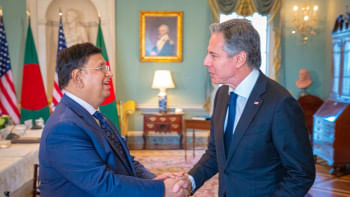
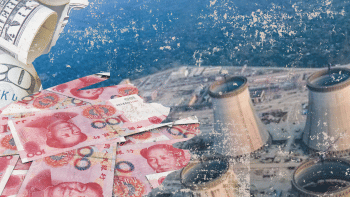
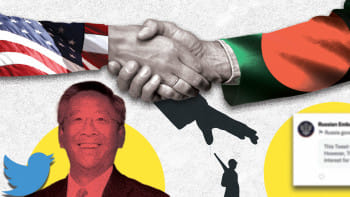
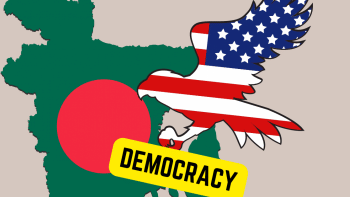






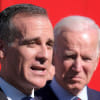


Comments